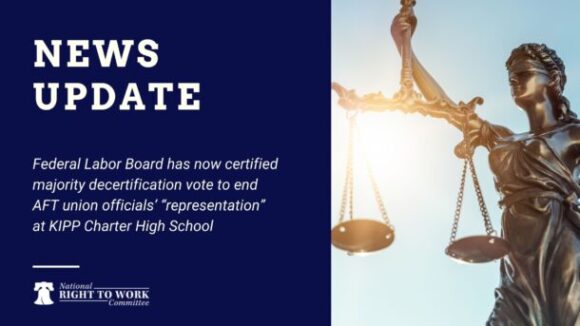Will Team Biden Weaponize Workers’ Pensions?
Big Labor abuse of worker pension and benefit funds as a means of advancing union bosses’ self-aggrandizing policy objectives is a familiar phenomenon.

Back in 1948, for example the American Federation of Labor (AFL) union plaintiffs in the Lincoln case, who were trying to get state Right to Work laws prohibiting compulsory union membership and dues declared unconstitutional, told the U.S. Supreme Court:
[T]he right to work as a non-unionist is in no way equivalent to or parallel of the right to work as a union member; . . . there exists no constitutional right to work as a non-unionist on the one hand while the right to maintain employment free from discrimination because of union membership is constitutionally protected.
In recent decades, Big Labor has normally been more circumspect, but union bosses’ views manifestly haven’t changed. In a 2002 book, for example, pro-union monopoly labor historian Nelson Lichtenstein charged that Right to Work laws represent “an ideological onslaught [against unions] of the first order,” because under such laws the rights of workers who oppose unionization are “given the same moral weight as those of workers loyal to the union idea.”
Even when union officials seem to contradict the AFL’s Lincoln brief and Lichtenstein and pay lip service to the right not to join a union, in practice only a handful at most believe the law should equally protect the right to join and the right not to join a union. The legal right not to join, union propaganda contends over and over again, is sufficiently protected if a worker who doesn’t want a union can refrain from becoming a formal union member, but can’t refuse, while keeping his job, to pay dues or fees that may be equivalent to or nearly equivalent to what a voluntary union member pays.
No union official would say that a law allowing a worker to become a union member over the objections of his employer and fellow employees, but not allowing him to pay dues to the union he’s joined, provides adequate protection for the right to join. Yet Big Labor insists workers who prefer to remain union-free should be satisfied with only nominal legal protection for their choice.
More than 150 years ago, responding to a letter inviting him to a Boston event commemorating the birth of Thomas Jefferson, Abraham Lincoln wrote eloquently about the people of his time who treasured freedom for themselves while denying it to others. Of course, Lincoln’s words were offered in reference to supporters of chattel slavery, not compulsory unionism.
No one contends that compulsory unionism is an evil as grave as slavery. Nevertheless, Lincoln’s famous April 1859 letter (see the link below) seems relevant to the debate in our time over government-promoted monopolistic unionism:
Those who deny freedom to others, deserve it not for themselves; and under a just God, can not long retain it.

Big Labor abuse of worker pension and benefit funds as a means of advancing union bosses’ self-aggrandizing policy objectives is a familiar phenomenon.

What impact does handing a union monopoly power to deal with your employer on matters concerning your pay, benefits, and work rules have on your pay?

Federal Labor Board has now certified majority decertification vote to end AFT union officials’ “representation” at KIPP Charter High School